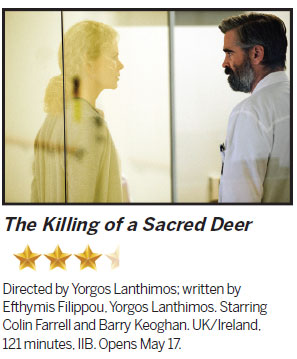Lobster was great, Deer's even better
Updated: 2018-05-11 08:16
By Elizabeth Kerr(HK Edition)
|
|||||||||
Greek director Yorgos Lanthimos is not to all tastes. The polar opposite, tonally and stylistically, of most of the moderately challenging or brazenly popcorn material currently gracing the screens, Lanthimos' films are like fine wine. The longer it breathes the richer it gets. Case in point, 2015's The Lobster, a pitch-black satire of the contemporary romance genre.
Lanthimos is back at it, collaborating again with his new muse, Colin Farrell, in The Killing of a Sacred Deer. Best described as alternative voodoo chiller, the film takes a fundamental horror trope - stranger infiltrates and destroys a family from within - and warps into something simultaneously transgressive, absurd and emotionally wrenching. At the heart of the story is handsome, successful surgeon Steven Murphy (Farrell), whose perfect, oddly structured life includes slightly fetishistic sex with his icy wife Anna (Nicole Kidman) and possibly a drinking problem. His best friend appears to be an emotionally stunted teen, Martin (Barry Keoghan, Dunkirk), whom he regularly meets at a diner near work and seems to be mentoring.

Steven introduces Martin to his impeccable family, which includes ultra-adjusted children Bob and Kim (Sunny Suljic and Raffey Cassidy), who begin falling ill as Martin digs in deeper and deeper before finally revealing an ulterior motive we all knew was coming. Ultimately, Steven and Anna are compelled to confront the ghosts of their perfect life and pay the bill on its outstanding debts. The film builds to a shocking ending, less so for its execution than for the dispassionate inevitability of it all. This is not a Hollywood film.
The Killing of a Sacred Deer's retro visuals, long, static corridor shots and aural hush conspire to make the film something of a puzzle that effortlessly toggles among bleak dark comedy, discomfiting psycho-sexual thriller and quiet meditation on guilt, rage and reparations - all with a supernatural spin that can be taken symbolically or straight. In typical Lanthimos fashion, the robotic line readings and unnatural physicality ironically bring the emotions at the story's core into sharp relief; they belie an utter lack of control for Steven and misguided mastery for Martin. As strong as The Lobster was, it ran out of narrative steam before the end, but Deer does not, and is easily Lanthimos' most cohesive film yet.
Deer would unravel without its finely calibrated performances: Cassidy manages just the right kind of teenaged disaffection and Suljic the right kind of pre-teen eagerness to impress that traps them, and Kidman once again demonstrates she's most affecting in small, potent doses, where her cool, distancing persona has the most impact. But Keoghan and Farrell carry the load. In Bruges director Martin McDonagh and Lanthimos have best exploited Farrell's subtle mix of charm, danger and ennui, and here, with Keoghan, he's crafted an indelible karmic portrait, loaded with questions he never stoops to answer.

(HK Edition 05/11/2018 page11)